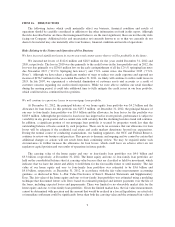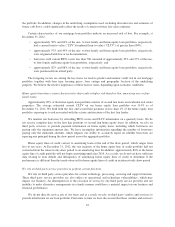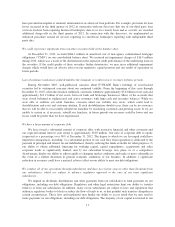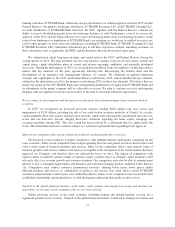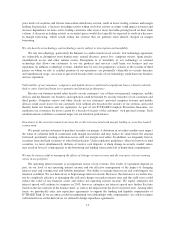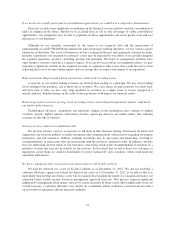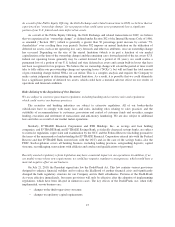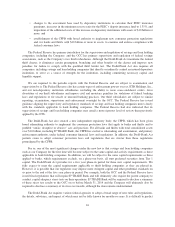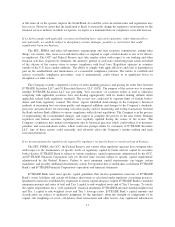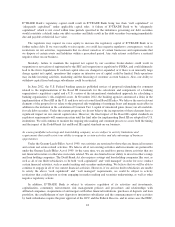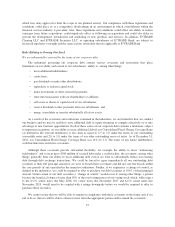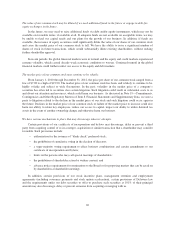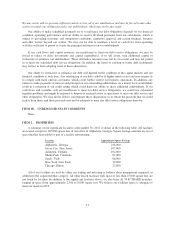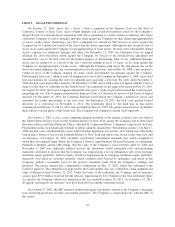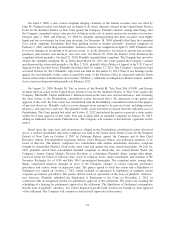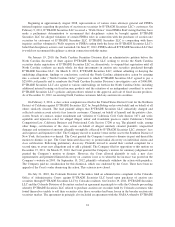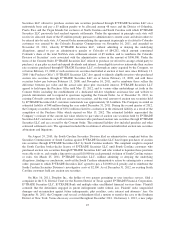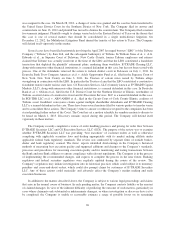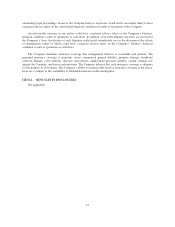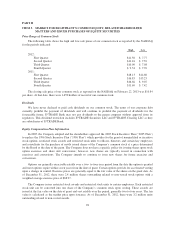eTrade 2012 Annual Report Download - page 21
Download and view the complete annual report
Please find page 21 of the 2012 eTrade annual report below. You can navigate through the pages in the report by either clicking on the pages listed below, or by using the keyword search tool below to find specific information within the annual report.E*TRADE Bank’s regulatory capital could result in E*TRADE Bank being less than “well capitalized” or
“adequately capitalized” under applicable capital rules. A failure of E*TRADE Bank to be “adequately
capitalized” which is not cured within time periods specified in the indentures governing our debt securities
would constitute a default under our debt securities and likely result in the debt securities becoming immediately
due and payable at their full face value.
The regulators may request we raise equity to increase the regulatory capital of E*TRADE Bank or to
further reduce debt. If we were unable to raise equity, we could face negative regulatory consequences, such as
restrictions on our activities, requirements that we divest ourselves of certain businesses and requirements that
we dispose of certain assets and liabilities within a prescribed period. Any such actions could have a material
negative effect on our business.
Similarly, failure to maintain the required net capital by our securities broker-dealers could result in
suspension or revocation of registration by the SEC and suspension or expulsion by FINRA, and could ultimately
lead to the firm’s liquidation. If such net capital rules are changed or expanded, or if there is an unusually large
charge against net capital, operations that require an intensive use of capital could be limited. Such operations
may include investing activities, marketing and the financing of customer account balances. Also, our ability to
withdraw capital from brokerage subsidiaries could be restricted.
In June 2012, the U.S. Federal banking agencies published notices of proposed rulemaking for comment
related to the implementation of the Basel III framework for the calculation and components of a banking
organization’s regulatory capital and a U.S. version of the international standardized approach for calculating a
banking organization’s risk-weighted assets. In November 2012, the banking agencies announced a delay in the
implementation of Basel III in the U.S. and have not yet issued final Basel III rules. We believe the most relevant
elements of the proposal to us relate to the proposed risk-weighting of mortgage loans and margin receivables in
addition to the inclusion in the calculation of Common Tier 1 capital of unrealized gains (losses) on all available-
for-sale debt securities. Under the current proposal, we do not believe the incorporation of these elements have a
significant impact on our current capital ratios. However, the final impact of the Basel III capital standards on
regulatory requirements will remain uncertain until the final rules for implementing Basel III are adopted for U.S.
institutions. We will continue to monitor the ongoing rule-making and comment process to assess both the timing
and the impact of the Dodd-Frank Act and Basel III capital standards on our business.
As a non-grandfathered savings and loan holding company, we are subject to activity limitations and
requirements that could restrict our ability to engage in certain activities and take advantage of business
opportunities.
Under the Gramm-Leach-Bliley Act of 1999, our activities are restricted to those that are financial in nature
and certain real estate-related activities. We believe all of our existing activities and investments are permissible
under the Gramm-Leach-Bliley Act of 1999. At the same time, we are unable to pursue future activities that are
not financial in nature or otherwise real-estate related. We are also limited in our ability to invest in other savings
and loan holding companies. The Dodd-Frank Act also requires savings and loan holding companies like ours, as
well as all of our thrift subsidiaries, to be both “well capitalized” and “well managed” in order for us to conduct
certain financial activities, such as market making and securities underwriting. We believe that we will be able to
continue to engage in all of our current financial activities. However, if we and our thrift subsidiaries are unable
to satisfy the above “well capitalized” and “well managed” requirements, we could be subject to activity
restrictions that could prevent us from engaging in market making and securities underwriting, as well as other
negative regulatory actions.
In addition, E*TRADE Bank is subject to extensive regulation of its activities and investments,
capitalization, community reinvestment, risk management policies and procedures and relationships with
affiliated companies. Acquisitions of and mergers with other financial institutions, purchases of deposits and loan
portfolios, the establishment of new depository institution subsidiaries and the commencement of new activities
by bank subsidiaries require the prior approval of the OCC and the Federal Reserve, and in some cases the FDIC,
18



